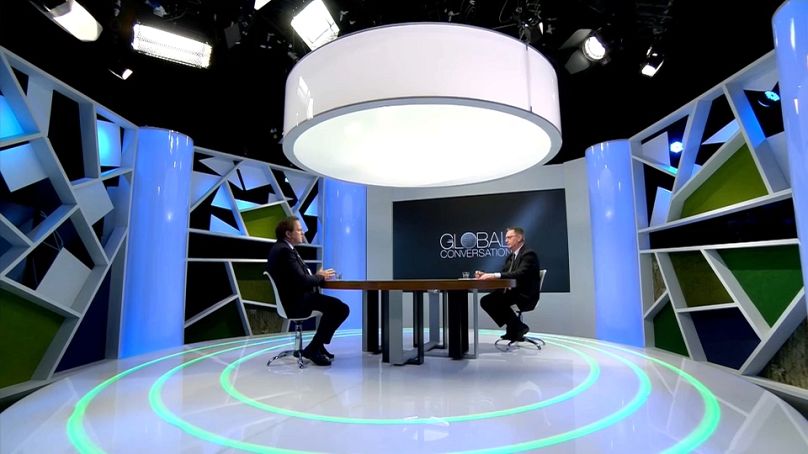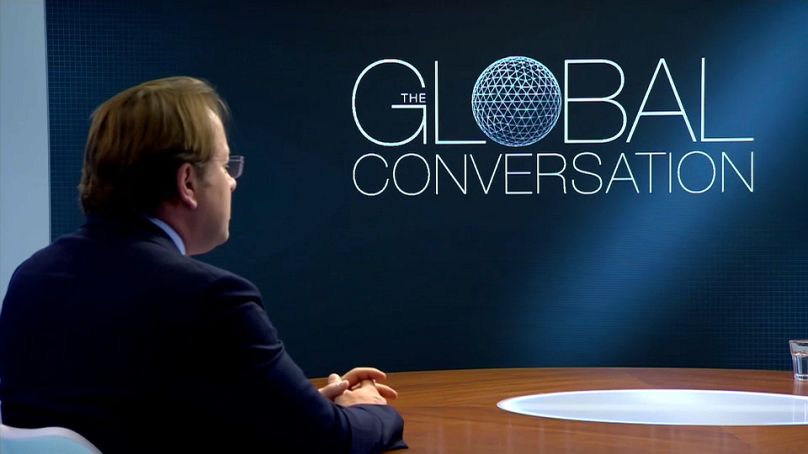"I think if there is one positive outcome of this war if there is any, is that it is a very clear reinforcement of the need to enlarge the European Union." Olivér Várhelyi, EU Commissioner for Neighbourhood and Enlargement with an in-depth discussion.
The guest on the Global Conversation is Olivér Várhelyi, the EU Commissioner for Neighbourhood and Enlargement. The interview took place in Brussels ahead of the EU Western Balkans summit and the discussion covered all aspects of the EU's enlargement process.
The first question by Euronews journalist Sándor Zsiros was why the Western Balkans enlargement should be a priority for Europe during the War in Ukraine and an energy crisis.
"If Europe wants to create its long-term peace, security, and prosperity, it has to enlarge. Because if the region surrounding is not part of the European Union, it is clear that the vulnerabilities of these regions will only increase." Replied Várhelyi. "I think if there is one positive outcome of this war if there is any, is that it is a clear reinforcement of the need to enlarge the European Union."
There is an upcoming EU Western Balkans summit in the Albanian capital Tirana, and Várhelyi explained why he felt this was important and that many shared challenges lay ahead, including tackling the current energy crisis.
"We need to keep the Western Balkan partners fully involved and included in our debates." He said. "For example, the energy crisis in Europe doesn't have borders, and the migration pressure on the Western Balkan route is also pressure on Europe."
One candidate country is Serbia, which is failing to align with the EU sanctions regime against Russia. This poses the question, can they keep their candidate status and have an opt-out from the EU sanctions?
On this point, Várhelyi was most forthright. "I don't think that they have an opt-out on sanctions. Don't forget that Serbia still has to finish a dialogue on the Belgrade-Prishtina dialogue to get to an agreement on the modalities of the coexistence. And this is why vulnerabilities in Serbia are much higher when it comes to exposure to Russia. One should not forget that Serbia has been voting with us throughout the UN General Assembly votes condemning Russia for all the acts carried out in Ukraine. To me, this is a very strong political message when it comes to sanctions."
The Belgrade-Pristina dialogue towards the normalisation of the relations referred to in Várhelyi's answer was picked up by Euronews journalist Sándor Zsiros, who asked what the end of this could be.
"The end of this would be a recognition of Kosovo as an independent state by Serbia." Replied Várhelyi. "But for this to happen, the road is still long."
Replying to the question of when it would be possible for the EU to lift the Schengen visa regime for the citizens of Kosovo, Várhelyi said, "We are anticipating a decision next month. I hope we can finally provide this facility for Kosovo, the last country or entity in the region that does not enjoy this yet."
Attention was then turned towards Bosnia and Herzegovina, and the point was raised that their separatism is a real danger. As Várhelyi had recently met with Milorad Dodik, the leader of the Bosnian Serbs, the question was asked about whether he is a reliable partner to have a European path for Bosnia.
"Well, yes, politics is always about personalities as well, but not only." Said Várhelyi. "And if all goes well, we will see a swift picking up of functioning by the new institutions. I think this is very good news. And in that, one has to acknowledge also the contribution of the president of the Republika Srpska."
Following this response was an issue regarding the questioning of the democratic integrity of Serbia by NGOs. Whilst agreeing that there was still work to do in Serbia, Várhelyi was also quick to point out that progress had been made in the country.
"Major reforms have been delivered, like the referendum on the court system, a major amendment of the constitution in relation to the judiciary, and the Programme for Media Freedom." Asserted Várhelyi, adding, "If Serbia goes faster on the rule of law area, we should be able to move faster with them on accession negotiations as well."
Sándor Zsiros then pointed to criticism of Várhelyi from some European Parliament MEPs regarding democracy and rule of law in the Western Balkans. But Várhelyi played down such accusations and said, "First of all, it was my proposal that has put front and centre the rule of law issue." Adding, "This sounds more like a political game than a real and founded criticism." He also said that he saw himself as a "neutral player" in the enlargement process.
On the issue of North Macedonia, and its 17-year wait to start negotiations for accession to the EU, as well as Bulgaria's part in attempting to block them, Várhelyi was clear that together with the French presidency, a "political and legal framework" had been established through which it would now be possible for the two countries to "overcome difficulties". Adding, "Needless to say in the Balkans these kinds of issues are always recurrent."
He also said, "Under the Copenhagen criteria having good neighbourly relations, has always been a criterion. And don't forget that any enlargement requires the unanimous support of all the member states, because this is not a foreign policy issue."
Sándor Zsiros then asked Várhelyi about growing scepticism towards support for a European perspective in some Western Balkan countries. In his response, Várhelyi said that he was not surprised by this as the previous commission had originally been opposed to enlargement and had effectively, "turned its back" on the Western Balkans and its neighbourhood. Something which he described as "major political mistake."
But he was also quick to praise the track record of the current commission on this issue saying that first of all it had, "dragged enlargement out of the ditch." Secondly, he said it had been put back at the "top of the political agenda". And thirdly he said that it looked beyond the "institutional Brussels bubble focus," and instead concentrated on the issue of "real integration on the ground."
He went on to say, "We have put on the table a robust, substantive economic and investment plan for the Western Balkans that is mobilising €30 billion, which is one-third of the GDP of the whole region." He said this would help address the issues of infrastructure for trade routes in the region, tackle the energy crisis, and help to establish renewable energy supplies. He added that through regional cooperation another third of the GDP could also be additionally created.
"So we have a plan," Várhelyi added. "You will see the roaming. You will see the highways emerging. You will see new energy projects coming up where Europe is going to be in the lead."
Finally, he would not be drawn on the question to name the country he thinks will become the next member of the EU and when. But he did tactfully reply, "I do hope that we will have at least one country who will finish its accession negotiations by the end of my mandate."
Watch the video above to view the interview in full.












